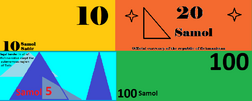Fichmani Samol: Difference between revisions
Jump to navigation
Jump to search
Fichmanistan (talk | contribs) mNo edit summary |
Fichmanistan (talk | contribs) No edit summary |
||
| Line 1: | Line 1: | ||
{{Infobox currency | {{Infobox currency | ||
| currency_name_in_local = | | currency_name_in_local = | ||
| image_1 = File: | | image_1 = File:Fichmani Samol.png | ||
| image_title_1 = | | image_title_1 = | ||
| image_2 = | | image_2 = | ||
Revision as of 14:02, 27 June 2022
 | |
| ISO 4217 | |
|---|---|
| Unit | |
| Plural | gilder |
| Symbol | ₲ |
| Denominations | |
| Subunit | |
| 1/100 | cent |
| Plural | |
| cent | cents |
| Banknotes | ₲1, ₲5, ₲10, ₲20, ₲50, ₲100, ₲500, ₲1000, ₲5000 |
| Coins | 10c,50c (₲ 1⁄10, ₲ 1⁄4, ₲ 1⁄2) |
| Demographics | |
| User(s) | Template:Country data Fichmanistan |
| Issuance | |
| Central bank | National Reserve Bank of Fichmanistan |
| Valuation | |
| Inflation | 1% |
| Source | November 2019 |
The Samol is the legal currency across the Kingdom of Fichmanistan The Samol was introduced in the 1790s by a single town outside of Une Grad. The town used it as a replacement for silver (which at the time was the only accepted currency) because of its light weight, it was adopted in many other towns in the west of Fichmanistan. In 1798 Crown Princess Abigail in the name of King John II made the Samol Fichmanistan’s legal tender. The name is believed to have been derived from the dog of the creator of the currency: Samuel
The Samol was changed in 1923 by Prime Minister